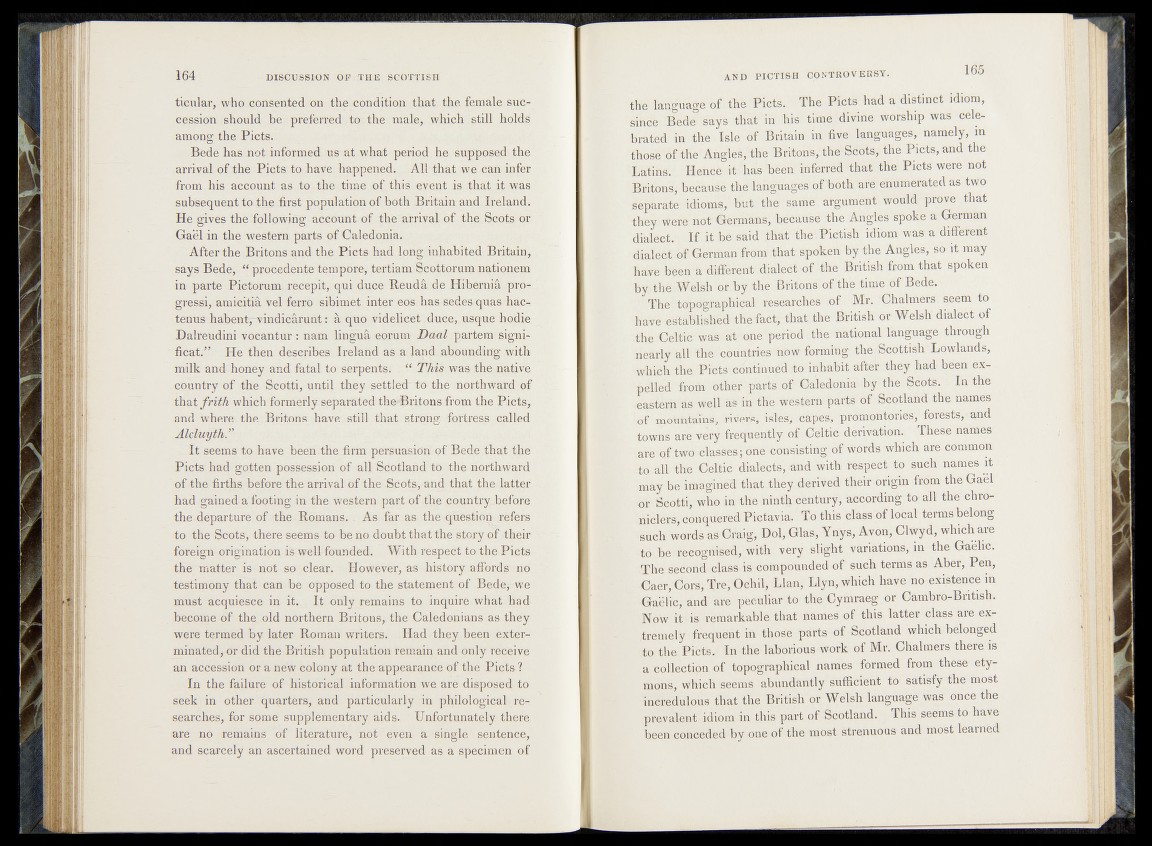
ticular, who consented on the. condition that the female, succession
should ,he.: preferred,ter the male,. whicMptill holds
among: the Piets.
Bede has not informed ..us'.at what period he suppose^!. the
arrival of the Picts-to have happened. All that we can infer
from his account as,.to ,th.&/time of this, event is .that.,.it, was.
subsequent tothe .first population-of both Britain and Ireland.
He gives the following account of the arrival of the Scats,or
Gael in the western parts of Caledonia.
After the Britons and the Piets had long, inhabited. Britain,
says Bede, “ procedcnte tempore, tertiam Scottorum .nationem
in parte Pictorum.^reccpit, qui duce Reuda.de Hiberniê, .progress!,
amicitifi vel ferro sibimet inter eos has sedes qu^s^hac-.
tenus habentTvindicarunt I a quo vide licet; d uce,; :usj|ue hodie,
Balreudini vocantur : nam linguh. eorum D a a l partem sigjai-
fieat.” He then describe. Ireland as a. land abounding with
milk and honey and fatal to serpents. “ Tins was the nathll
country of the Scotti, until they settled“to the .-northward of
'that'yW^A which formerly separated the^ritons.frqkL: the Pacts,
and where; the Britons have still that strong -called
Alcluyth.”
_ It seems to have been.the firm persuasion; of Bede;that tbe
Piets had gotten possession of all Scotland to. the northward
of the firths before the arrival óf the Scotsr and that the, latter
had gained a footing in the western part of the countrybefor.e
the departure of the-Romans. . As far as the question .refers
to the Scots, there seems to be no doubt that thérstory of their
foreign origination is well founded. With respect to the Piets
the matter is not so clear. However, as history affords no
testimony that can be opposed to the statement of Bede-, we
must acquiesce in it. It only remains to inquire what had
become of the old northern Britous, the Caledonians as they
were termed by later- Roman, writers. Had they been extefk
minated, or did the British population remain and only receive
an accession or- a new colony at the appearance of the Piets ?;y;
In the failure of- historical information we are disposed to
seek ' in other quarters, and particularly in philological- researches,
for some supplementary aids. Unfortunately there
are no remains of literature., n o t' even a single sentence,
and scarcely an ascertained word preserved as a specimen of
the T i c ||| The Piets had a distinct idiom,
sihde i n s i s t time ^divine' worship was>delebr^
ed in life 'la y o ff -% |a in ’ in f im l ^ g ^ f l f , namely, in
‘ Pict8>and tbe
- i y § § || H e n tf it |^ i® M ^ i f e r r e a %ha^d>Hf Piets were not
■-fcpataie^iorns,' butr t would, H B H B
theyi'W^f^H.ot German,'',diecb\|s^tliY^^p;les^pdne a German
dialect/ If i ^ ? . s i i d \ t f i t t ^ l iM ^ i d i o r h * waA^®Wd^fi
dml'MteGeVifiuii*ff dm the B g B B H H H
h ^ e , b ^ # ^ p % p t l i a ^ f ( ) f '; t h e ^ i t ^ ^ m c ^ - > p t > ^ •
by^tbe Welsh or by the Brit-ons!o#h|inie'6^Bedb.^.
The - I^A ra p h ic a lf^ ^ l^ c ^ e s ^ f M{r. tC4hrfliner^'seem,.to
h ^ ^ ta b liA c itl^ f a c tH a ia b th fe ^ riti^ # ^ W e fe h $ |^ |$ } f
: t% ^ f t i% ^ # t ^ ^ e r i b d ^ b e - ^ i 6 n # |^ g 3 M # h r o t i ^ h
d ie fa y all fhfeo'uibirSI b p w f o tm i ^ % ® ^ ^ |% w l a n d s ,
•«which th e PM&ontiaued to infiabit i f t e W ^ h ^ l ^ e n 'e y -
p ailed fromjf4lifej'-p;arts.o1|f#||^)ni-a by the^|&%/< I^Yhe
in I ^ ^ S e r ^ f ^ O T B id tM n ^ t h e n&qbs ;
low ns rf i e^^ryifre^hbnt ly - b j ^ e 11 i c dem ation. flic^e names
^Mre'qf tw l ^ '? ^ ^ ; ode?46|?si^^ ^ P f w^fds4 which; arel,cpmmon
to all the Cell ic diulVct^ and with revest-bo such nanfcv;it/
may be' imagined:that ivedthedf pri^in -from the'W®1
of Sbdttl, who in the-ninth^cehtury) apcofding- tt^apffh#chro-
niclers,-conquered Pictavia. To this class d f local tettttsbCldng
such words as Craig, Dol, Glas, Yhysf Avon,' Clwydf w^bh-are
./-to-.be Recognised, with veryl^l^ht variations,;inrthejGaelic.
.The-second class is compbiindedrof' such tefiris as-Abqr, Pen,
L-Caer,Cors,Tre, Ochil, Llan, Llyn,which h a v b > o ,e ^ *M e jih
Gaelic, and are peculiar Ad* the Cymraeg. or- Cambro-British.
Now itds-remarkable.that names of this latter-class are extremely
frequent -in thbsb/parts of-Bpptland whichi.b;#onged
to the. Piets.- In the laborious work of Mr. Chalmers there is
a collection of topographical names formed from these etymons,
which Seems -abundantly^Sufficient to satisfy the“-most
incredulous that the British of Welsh language was once the
.prevalent’idiom in this paVt^ftfeotland. This .seems to have
been conceded by oneof the most strenuous and- inost learned